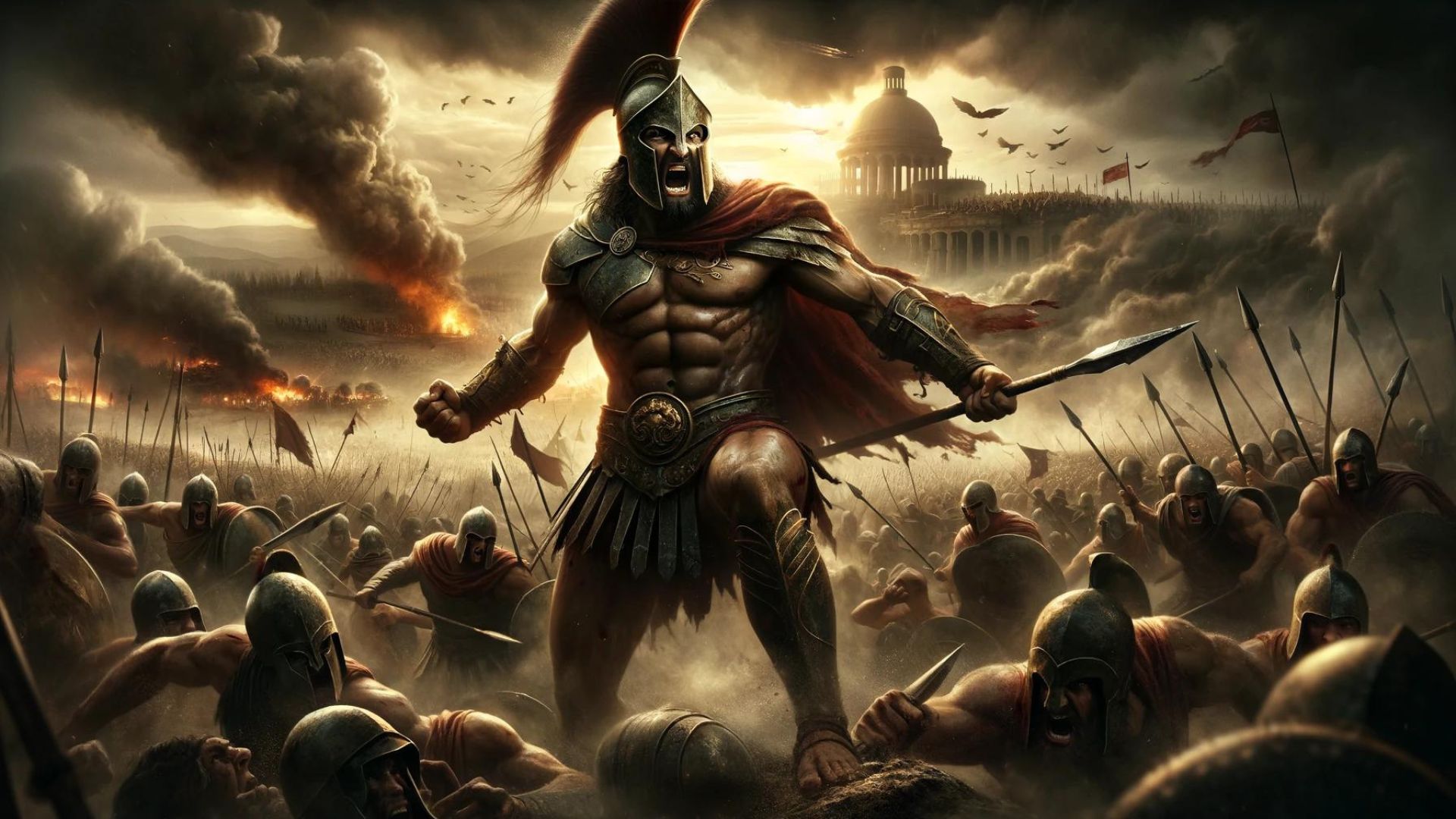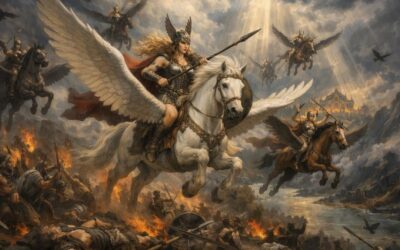Article Audio
The Wrath of Achilles
Throughout human history, myths and legends have acted as the strands that bind us to our past, creating narratives that deeply resonate with our shared humanity. Among these ancient narratives, the story of Achilles’ wrath in the Trojan War stands as a testament to the complexities of anger, pride, and the quest for glory. As we delve into this epic tale, we find not only a story of gods and heroes but also timeless lessons that mirror our own struggles and aspirations.
The tale begins in the midst of the Trojan War, a conflict that has raged for years, drawing in heroes and gods alike in a battle that would be remembered for ages. Achilles, the greatest warrior of the Greeks, becomes embroiled in a dispute that sees his honor challenged by Agamemnon, the leader of the Greek forces. When Agamemnon demands Achilles’ war prize, Briseis, as compensation for his own loss, Achilles’ pride is wounded. In his fury, Achilles withdraws from the battle, declaring that he will not fight until his honor is restored.
The wrath of Achilles sets off a chain of events that alters the course of the war. Without their most formidable warrior, the Greeks suffer great losses, pushing them to the brink of defeat. The story unfolds with a mix of divine intervention, heroic deeds, and tragic fates, culminating in Achilles’ return to battle following the death of his close friend Patroclus, who falls at the hands of Hector, the Trojan prince. Fueled by grief and a renewed sense of vengeance, Achilles’ wrath becomes his driving force, leading to a confrontation that would echo through history.
The narrative of Achilles’ rage, and the devastation it brings, serves as a powerful reflection on the nature of anger and its impact on human relationships. It reminds us that unchecked anger can lead not only to personal downfall but also to the suffering of those around us. The epic’s resolution, with Achilles finally relenting and returning Hector’s body to his grieving father, King Priam, highlights the potential for reconciliation and understanding even in the darkest of times.
This ancient story resonates with contemporary life in many ways. It invites us to consider our own moments of anger and pride, urging us to reflect on how we manage these emotions and their consequences. In a world where conflicts, both personal and global, often stem from similar feelings of slighted honor or unmet expectations, the Wrath of Achilles prompts us to search for ways to bridge divides and heal wounds.
As we reflect on the lessons from Achilles’ story, we find that the true battle lies within. It’s a battle to overcome our own egos, to listen, and to seek common ground even with those we consider our adversaries. The myth teaches us the value of empathy and the importance of understanding the stories of others, as well as our own.
In embracing these lessons, we can strive to mitigate our own moments of wrath, working towards resolution and peace in our interactions. Let the tale of Achilles inspire you to reflect on your own challenges and how you respond to them. Consider how empathy and understanding can transform your relationships and conflicts, bringing about a more harmonious existence.
As you navigate the complexities of life, remember the echoes of Olympus, where gods and mortals alike grappled with the same emotions and dilemmas that confront us today. Let the ancient stories guide you, not as distant myths, but as living narratives that continue to shape our understanding of the human condition.
So, take action. Reflect on your own moments of anger and pride. Seek understanding and reconciliation where there is conflict. Let the story of Achilles’ wrath and its resolution inspire you to find balance and harmony in your own life, proving that the wisdom of the past can indeed illuminate the path forward.
Why Should You Care?
Learning about the Wrath of Achilles and its themes is essential because it offers a mirror to our own lives, reflecting the depth of human emotions, the consequences of our actions, and the timeless struggle between personal honor and collective well-being. It encourages self-reflection on how we handle anger and conflict, promoting a deeper understanding of empathy, reconciliation, and the human condition. By exploring these ancient stories, we gain insights into our own behavior and are better equipped to navigate the complexities of interpersonal relationships and societal conflicts today.
Key Takeaways:
- The Complexity of Anger: The story illustrates how unchecked anger can lead to personal and collective downfall.
- The Impact of Pride: Achilles’ tale warns against letting pride dictate actions, showcasing the destructive path it can forge.
- The Power of Reconciliation: The resolution of Achilles’ wrath through his act of returning Hector’s body to Priam highlights the importance of empathy and understanding.
- Contemporary Relevance: The myth, though ancient, speaks to modern issues of conflict, honor, and the potential for resolution through empathy.
- Self-Reflection: The narrative encourages examining our own moments of anger and pride, urging a more empathetic approach to conflict resolution.
Keywords and Definitions:
- Wrath of Achilles: The intense anger and pride of Achilles, leading to his withdrawal from battle in the Trojan War, affecting its outcome.
- Trojan War: A legendary conflict between the kingdoms of Troy and Mycenaean Greece, rich in heroism, deceit, and divine intervention.
- Honor: A core theme, referring to one’s reputation and standing among peers, often driving actions and decisions in the story.
- Reconciliation: The act of resolving conflict and restoring harmony, exemplified by Achilles’ eventual peace with Priam.
- Empathy: The ability to understand and share the feelings of another, crucial for overcoming pride and anger.
- Ego: A person’s sense of self-esteem or self-importance, often a barrier to empathy and understanding in conflicts.
- Human Condition: Refers to the experiences, emotions, and challenges inherent in human life, as echoed in myths and legends.
- Interpersonal Relationships: The dynamics and interactions between individuals, shaped by emotions like anger and pride.
- Conflict Resolution: Strategies and approaches to address and solve disputes, emphasizing understanding and compromise.
- Ancient Narratives: Stories from the past that provide lessons and insights relevant to contemporary life and human behavior.
Frequently Asked Questions:
Why did Achilles’ wrath have such a significant impact on the Trojan War?
Achilles was the greatest warrior of the Greeks; his withdrawal from battle due to his wrath significantly weakened the Greek forces, altering the course of the war. His anger demonstrates how individual emotions can have far-reaching effects on collective endeavors.
How does the story of Achilles relate to modern-day conflicts?
The themes of pride, anger, and the quest for honor in Achilles’ story are timeless, reflecting the same motivations and emotions that drive contemporary personal and societal conflicts. It teaches the importance of empathy and understanding in resolving disputes.
What lessons can we learn from Achilles’ reconciliation with Priam?
This act highlights the power of empathy and the potential for healing even in the deepest of conflicts. It reminds us that reconciliation is possible through mutual understanding and respect, providing a path to peace and resolution.
Myth Buster:
Myth: The story of Achilles is just a tale of heroism and glory in battle.
Reality: While the story includes heroic deeds, it primarily serves as a cautionary tale about the dangers of unchecked anger and pride. It emphasizes the importance of empathy, reconciliation, and understanding in resolving conflicts and restoring harmony.
Let’s Talk:
- How do you think the concept of honor in Achilles’ time compares to today’s understanding of the term?
- Can you recall a time when your pride or anger led to a conflict? How was it resolved?
- Do you believe empathy can always lead to reconciliation? Why or why not?
I encourage you to share your thoughts and experiences in the comments section. Let’s dive deeper into the lessons from the past and how they apply to our lives today. Your perspectives enrich the discussion and help us all learn from each other.










0 Comments